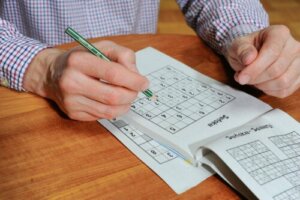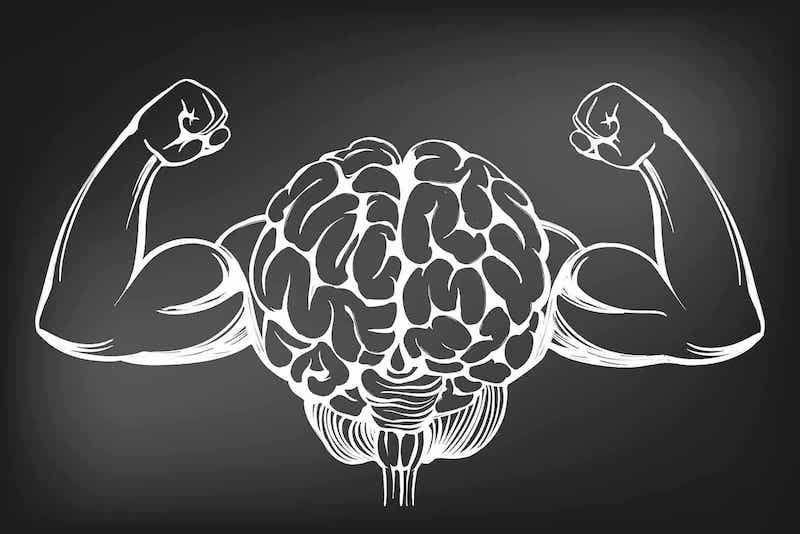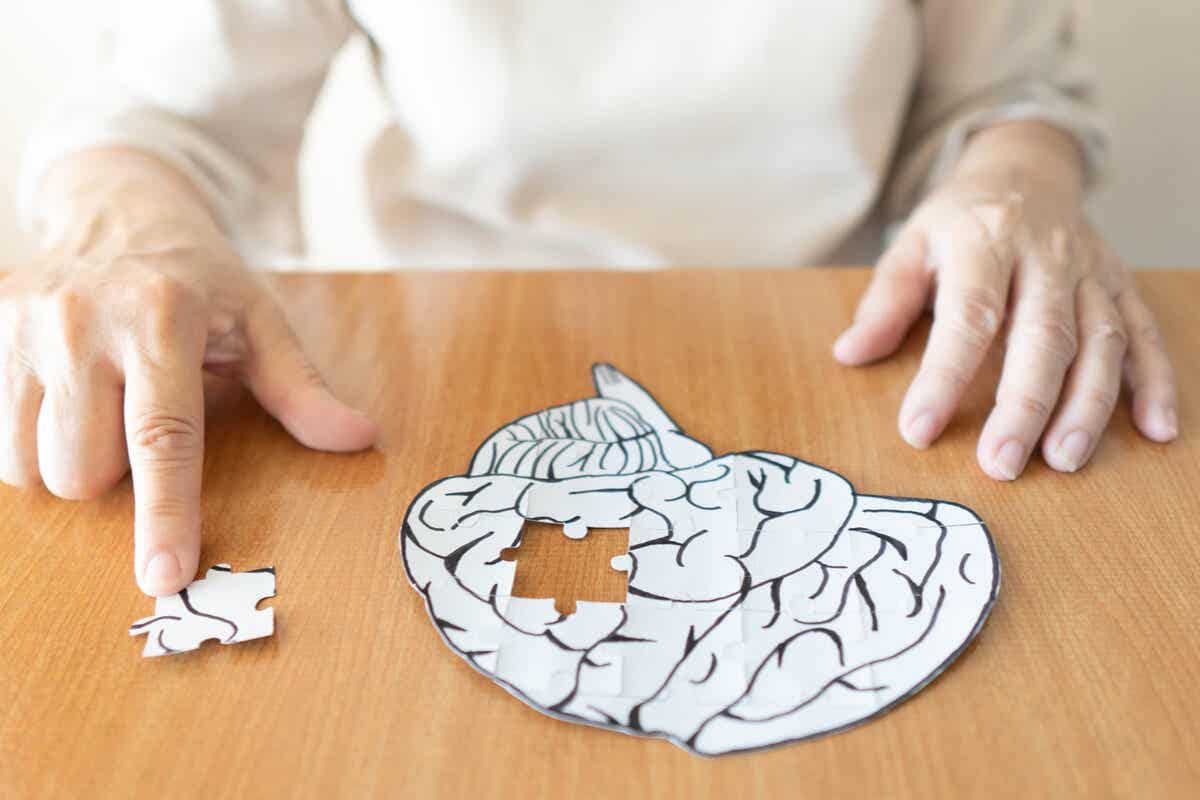The Benefits of Sudoku for the Brain, According to Science

Sudoku is a highly complex mental game; the task of ordering numbers requires a lot of effort that has many benefits for the brain. This has been proven by science. The game originated in the United States, but it became popular after it arrived in Japan. Find out about the benefits of Sudoku in this article!
This game consists of filling in a grid of 9 by 9 cells–which, in turn, is divided into smaller grids of 3 by 3–with numbers from 1 to 9. Puzzles are presented with some numbers already filled in, which are known as given digits or clues. Playing it is very straightforward, although there are Sudokus of different levels of difficulty.
Although the game is based on numbers, you don’t need to have the best math skills in the world to start practicing it. It’s a lot of fun and, with practice, you’ll start to build up your skills.
Patience is essential because completing a puzzle can take quite some time. However, remember to keep calm and that practice makes perfect; in time you’ll be able to do the puzzles faster and faster.
Skills that Sudoku improves
Playing Sudoku brings many benefits for your brain; you’ll train skills you already have and also acquire some new ones. For example, Sudoko is a workout for your perception, memory, logic, and coordination.
Studies on the use of math in these types of games have shown that among the skills required are ingenuity, imagination, and patience. This means that practicing Sudoku will help you learn to handle stressful situations. It’s a good idea to start with the easier puzzles.
Keep reading: 11 Strategies to Help You Be Smarter
The potential health benefits of Sudoku
Playing Sudoku has multiple health benefits, especially for the brain. Here’s how this game has a positive impact.

It stimulates logical thinking
Logical thinking is the ability to understand your surroundings and the relationships or differences between actions, objects, or facts. You learn this through analysis, comprehension, abstraction, and imagination.
According to some studies, games like Sudoku involve curious mathematical problems that stimulate logical thinking and especially mathematical logical thinking.
It encourages quick thinking
Once you start completing Sudokus and move from easier levels to more difficult puzzles, you’ll see that as time goes by you’ll be able to complete them faster and faster, thanks to the analysis and abstraction you put into practice. This is referred to as quick thinking, which Sudoku stimulates and improves.
It improves concentration
Sudoku requires several skills. Among these is concentration, which is almost a prerequisite for successfully completing the game. You have to avoid repeating numbers or placing them incorrectly.
Such is its contribution in this sense that research has shown that Sudoku is one of the best ludic-pedagogical activities practiced in classrooms to increase students’ attention and concentration.
It develops problem-solving skills
When you start playing Sudoku as a beginner, you’ll realize that it can be a bit tedious and frustrating, either because you take a long time to complete them or because you haven’t yet developed all your skills. In the process, you learn to develop your problem-solving skills with more focus.
Science has proven, from different points of view, that math and didactic games based on numbers contribute to increasing this ability.
It increases the quality of cognitive function
Many factors can affect the quality of cognitive function, especially old age. A study that sampled adults aged 50 to 93 years found that frequent practice of number puzzles such as Sudoku has a strong association with the quality of cognitive function in this population.
It helps reduce stress
Stress is a result of overexertion and manifests itself on a physical and emotional level; it’s most likely due to psychological demands placed on the brain. It affects health in multiple ways. Studies have shown that it can alter the processes of plasticity and neurogenesis.
However, board games or mentally demanding games such as Sudoku are usually very relaxing. As such, if you’ve had a stressful day, taking 10 minutes to do a simple Sudoku can help clear your mind and activate it so that you can return to work recharged.
Discover: Daily Stress Can Cause Depression
The importance of exercising the brain

Research has shown that daily learning, such as playing games like Sudoku, stimulates the brain, improves brain function, and prevents cognitive decline. All of this translates into well-being.
That well-being, in turn, means greater resistance to forgetfulness and memory impairment. You’ll be more alert and your abilities will remain powerful for a long time.
Activities such as Sudoku which you can do to exercise your brain are known as brain gymnastics. They’re widely used to strengthen and develop skills such as creativity.
Enjoy the benefits of Sudoku for your brain!
You’ve already seen some of the benefits of Sudoku for your brain. Can you imagine how sharp you’d be if you’d been completing Sudokus since childhood?
Still, it’s not too late. You can start now and encourage your children to play the game. In addition to improving their brain function, it’ll improve their quality of life. The benefits will stay with them forever, helping prevent cognitive decline.
All cited sources were thoroughly reviewed by our team to ensure their quality, reliability, currency, and validity. The bibliography of this article was considered reliable and of academic or scientific accuracy.
- Becerra, Alberto; Núñez, Juan; Perea, José María (2016) ¿Cuánta matemática hay en los sudokus?. Revista Pensamiento Matemático, Vol 6, Nº 1, pags 113-136. Sección juegos y rarezas matemáticas. España. Recuperado de dialnet.unirioja.es
- Javier Suárez Quero. Las matemáticas en el sudoku. Universidad de Almería, 2017. Disponible en: http://repositorio.ual.es/bitstream/handle/10835/6445/16582_Suarez%20Quero%2C%20Javier.pdf?sequence=1&isAllowed=y
- Kahnmena Daniel. Pensar rápido, pensar despacio.
- Leal Huise, Sandra, & Bong Anderson, Simón (2015). La resolución de problemas matemáticos en el contexto de los proyectos de aprendizaje. Revista de Investigación, 39(84),71-93.[fecha de Consulta 17 de Marzo de 2021]. ISSN: 0798-0329. Disponible en: https://www.redalyc.org/articulo.oa?id=3761/376140399004
- Romero, Rosario, & Cueva, Henry, & Barboza, Luis (2014). La gimnasia cerebral como estrategia para el desarrollo de la creatividad en los estudiantes. Omnia, 20(3),80-91.[fecha de Consulta 17 de Marzo de 2021]. ISSN: 1315-8856. Disponible en: https://www.redalyc.org/articulo.oa?id=737/73737091006
- Zárate, S., & Cárdenas, F. P., & Acevedo-Triana, César, & Sarmiento-Bolaños, M. J., & León, L. A. (2014). Efectos del estrés sobre los procesos de plasticidad y neurogénesis: una revisión. Universitas Psychologica, 13(3),15-47.[fecha de Consulta 17 de Marzo de 2021]. ISSN: 1657-9267. Disponible en: https://www.redalyc.org/articulo.oa?id=647/64733438030
- Lluen Rodríguez, J. D. (2017). Proyecto “Sudoku” en la capacidad de resolución de problemas matemáticos de los estudiantes del segundo año de secundaria de la IEP.“Henri Wallon” 2016.
- Lozano Alonso, S., & Pérez Sanz, J. R. Evaluación de la mejora del sentimiento de soledad en pacientes geriátricos institucionalizados mediante la realización de actividades socioculturales a través de la escala ESTE II.
- Giraldo Pinzón, H. D., Mendoza Toloza, C. A., & Ávila Plaza, P. A. (2019). Alzheimind: aplicación móvil que utiliza inteligencia artificial para el tratamiento temprano del Alzheimer.
- Llerena Gomez, C. E. (2018). Razonamiento lógico y su impacto en el proceso de enseñanza-aprendizaje de los estudiantes de la Escuela “Aurora Estrada Ayala De Ramirez Perez” de la ciudad de Babahoyo provincia de los Rios (Bachelor’s thesis, BABAHOYO: UTB, 2018).
- Rios Mendoza, F. M., & Romero Ruiz, G. R. (2019). Efecto del programa de ludoterapia en la calidad de vida de los adultos mayores del CIAM–YANTALÓ, 2019.
- Ruiz, M. J. A. (2019). Los pasatiempos como recurso didáctico en el aula de E/LE (1): Planteamientos generales. Los mensajes cifrados. Foro de profesores de E/LE, (15), 1-18.
- García, B. E. (2020). PROGRAMA DE SALUD: LA JUBILACIÓN, PUNTO DE PARTIDA.
- Sandí Delgado, J. C., & Espinoza Torres, I. Fortalecimiento de la calidad de vida de las personas adultas mayores del Caribe costarricense.
- Arias Hidalgo, E. N. (2019). EL JUEGO SUDOKU Y EL DESARROLLO DEL PENSAMIENTO LÓGICO MATEMÁTICO EN LA INSTITUCIÓN EDUCATIVA INTEGRADA “PEDRO SÁNCHEZ GAVIDIA”–HUÁNUCO–2017.
- Romano, M., Nissen, M. D., Del Huerto, N., & Parquet, C. (2007). Enfermedad de alzheimer. Revista de posgrado de la vía cátedra de medicina, 75, 9-12.
- Luque Lopez, M. E. (2020). Sudoku como herramienta para elevar el nivel de concentración de los estudiantes del primer grado de educación secundaria de la Institución Educativa “Simón Bolívar”, de Moquegua-2019.
This text is provided for informational purposes only and does not replace consultation with a professional. If in doubt, consult your specialist.








